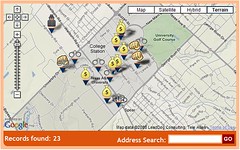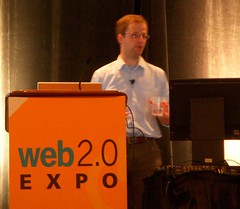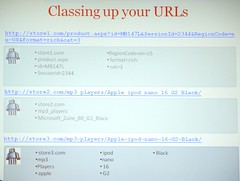Welcome to Natural Search Blog
Natural Search Blog provides articles on search engine optimization including keyword reasearch, on-page factors, link-building, social media optimization, local search optimization, image search optimization, and mobile SEO.
In addition to natural search optimization topics, we also cover internet marketing, ecommerce, web design, usability, and technology.
Recent Entries
New Print Yellow Pages Usage Stats from comScore-TMP Study
 TMP Directional Marketing and comScore announced their annual joint “Local Search Usage Study” today, and there were some interesting statistics:
TMP Directional Marketing and comScore announced their annual joint “Local Search Usage Study” today, and there were some interesting statistics:
- Following online local searches, consumers most often contact a business over the telephone (39%), visit the business in-person (32%) or contact the business online (12%).
- 1 out of 5 local business searchers with an Internet-accessible cell phone have conducted a local search via the mobile Web.
- Those that own wifi devices (such as the iPhone) are the most likely to conduct local business search via the mobile Web, with more than half of these respondents reporting mobile local business searching.
- 30 percent of respondents still rely on directories as their primary local business research source, despite a 3 percent decline from 2007 to 2008.
- Traditional IYP sites such as Superpages.com, YELLOWPAGES.COM, Yahoo! Yellowpages.com, etc. account for 60 percent of local IYP business searches.
- Local Search sites such as Google Maps, MapQuest, Yahoo! Local, etc. account for 40 percent of local IYP business searches. (more…)
Possible Related Posts
Posted by Chris of Silvery on 10/09/2008
Permalink | |  Print
| Trackback | Comments (0) | Comments RSS
Print
| Trackback | Comments (0) | Comments RSS
Filed under: Local Search, Market Data, Yellow Pages Phone-Books, print-yellow-pages, yellow pages usage, YP
Yellow Pages & Blog Payola
Ed Kohler, outspoken critic of YP industry, “outed” DexKnows.com for using Pay-Per-Post to increase links and associated PageRank for their site.
As you may know, Pay-Per-Post involves paying bloggers to write articles endorsing products, services or companies, and in this flavor it also involves using those posts to link back to the company’s site in order to help build PageRank.
The blog post is very thinly disguised payola – as Kohler points out, the blog is purportedly belonging to someone in Arkansas, while this post appears to be all oriented around providing keyworded links involving Pizza in Minneapolis through DexKnows. The blog has a large “payperpost” ad badge on it, too, and if you read through the articles, every single one seems to be engineered to sound like someone writing about random daily life incidents, but always with a couple of injected keyword links.
In context, it’s glaringly obvious that the blog is a paid posting. Kohler posts a comment below it, asking if it’s a paid post for Dex, and the author replies that she doesn’t “know who’s Dex”.
Kohler further pokes fun at Ken Clark, a yellow pages industry advocate, (more…)
Possible Related Posts
Posted by Chris of Silvery on 10/03/2008
Permalink | |  Print
| Trackback | Comments (0) | Comments RSS
Print
| Trackback | Comments (0) | Comments RSS
Filed under: Best Practices, Blog Optimization, Link Building, Search Engine Optimization, SEO, Worst Practices, Yellow Pages dexknows, paid blogging, pay per post, Yellow Pages
Ucrime.com Google Maps Mashup Provides Campus Crime Info
![]() Universities and colleges all over were interested in reporting on the launch of Ucrime.com recently, a Google Maps mashup (from the same folks who created Spotcrime.com). It maps out campus crime incidents for slightly over 200 universities.
Universities and colleges all over were interested in reporting on the launch of Ucrime.com recently, a Google Maps mashup (from the same folks who created Spotcrime.com). It maps out campus crime incidents for slightly over 200 universities.

Crimes at Texas A&M U (click to enlarge)
One of the very earliest Google Maps mashup applications was another site which also pinpointed crime data with its real-world locations: ChicagoCrime.org, created by Adrian Holovaty. Graphically displaying crime info and statistic info onto map locations is one of the more compelling applications for online maps, IMHO. (more…)
Possible Related Posts
Posted by Chris of Silvery on 10/01/2008
Permalink | |  Print
| Trackback | Comments (0) | Comments RSS
Print
| Trackback | Comments (0) | Comments RSS
Filed under: Maps Google-Maps, Mashups, Ucrime.com
Town Creates Smiley Face in Google Maps
Saw this interesting thing on Slashdot today:
Apparently this Russian town got a crowd of people to don yellow slickers and stand in a large smiley face pattern so that Google Earth and Google Maps could capture them in their next update.
Trick is, the Google Map screen-grab appears to be a very obvious hoax by a blogger dubbed “Heiner Wolf“. According to these photos, people really did turn out to form the smiley face — I would guess as part of a radio station promotion. But this blogger transposed the people onto the Google Maps image of the area. Lame!
There are plenty of instances of messages appearing in Google Maps pics, if you want to see real ones: examples of roof ads, cool things in Google Maps, marriage proposals, and the infamous Swastika Building.
Possible Related Posts
Posted by Chris of Silvery on 09/25/2008
Permalink | |  Print
| Trackback | Comments (0) | Comments RSS
Print
| Trackback | Comments (0) | Comments RSS
Filed under: Google, Maps aerial-images, Google-Maps, hoaxes, Satellite-Images
Google Street View Icon In Party Clothes
The Google Street View dude icon is suddenly sporting a party hat and balloons:
Assumably the special icon is celebrating Google’s 10th Birthday, though there’s no mention of it on the Google Lat Long Blog.
Possible Related Posts
Posted by Chris of Silvery on 09/23/2008
Permalink | |  Print
| Trackback | Comments (0) | Comments RSS
Print
| Trackback | Comments (0) | Comments RSS
Filed under: Google, Maps Google, Google-Maps, Street View
MS Live Search Tip: Keyworded URLs
 I was pleased to sit in a presentation by Nathan Buggia last week at the Web 2.0 Expo conference in New York. Nathan is the Lead Program Manager for Microsoft’s Live Search Webmaster Center, and his talk was on “Getting More Traffic from Search: Advanced SEO for Developers“.
I was pleased to sit in a presentation by Nathan Buggia last week at the Web 2.0 Expo conference in New York. Nathan is the Lead Program Manager for Microsoft’s Live Search Webmaster Center, and his talk was on “Getting More Traffic from Search: Advanced SEO for Developers“.
One of the more interesting things that Nathan covered were factors which provide specific benefit to page rankings in Live Search.
It was striking when he covered one element in particular: URL formatting.
Nathan stated that URLs which were shorter and which contain valuable keywords are likely to provide greater keyword relevancy benefit to pages which have them. URLs which are shorter and which have richer words that describe a page’s content work better for endusers and for marketing purposes. Users seeing a keyword-rich URL are more likely to click on them when they see them in search results page listings, because they reinforce the perception that they contain what the user is seeking. URLs also should have keywords delimited by dashes, rather than underscores or even periods.
Check out this slide from his presentation which demonstrates how keywords within the URL can provide additional signal to a page for the terms they represent:
Have difficulty in adding keyword URLs to your site? This is one of the things which GravityStream provides automatically (or even manually-generated). GravityStream proxies a site in order to automatically optimize a great many search ranking factors, including keyword-rich URLs.
Possible Related Posts
Posted by Chris of Silvery on 09/22/2008
Permalink | |  Print
| Trackback | Comments (0) | Comments RSS
Print
| Trackback | Comments (0) | Comments RSS
Filed under: MSN Search, Search Engine Optimization, SEO GravityStream, Live-Search, Nathan Buggia, SEO
Google Launches Audio Search
Google Labs has launched an experimental audio search which allows one to search text within YouTube videos. “Google Audio Indexing“, it’s called.

On the backend, Google has taken the audio tracks of YouTube videos of politicians, and automatically converted it to text for search capability.
How will this impact the overall internet? (more…)
Possible Related Posts
Posted by Chris of Silvery on 09/17/2008
Permalink | |  Print
| Trackback | Comments (0) | Comments RSS
Print
| Trackback | Comments (0) | Comments RSS
Filed under: Google blended search, Google Audio, video search, YouTube
Why avoiding meta keywords tag may be best
Around a year ago, Danny Sullivan did some great research on the Meta Keywords tag to determine which search engines are using it. He found indication that Google and Microsoft Live Search ignore it for keyword ranking (retrieval) purposes, while Yahoo! and Ask are apparently using it. With Google having the bulk of the search marketshare, and Yahoo possibly only using the tag to a limited degree, it would seem rather extraneous to continue using it for search optimization.
Although his research was really pretty definitive in my mind, there are so many search marketers that have some sort of nostalgic devotion to the tag and who continue to obsess over it and insist upon using it. There is a sort of mentality that “if it might help, then I’m damn well going to use it.” (See this recent thread at WebMasterWorld where quite a few express this viewpoint.)
However, I see some compelling reasons to avoid using it altogether… (more…)
Possible Related Posts
Posted by Chris of Silvery on 09/15/2008
Permalink | |  Print
| Trackback | Comments (0) | Comments RSS
Print
| Trackback | Comments (0) | Comments RSS
Filed under: Best Practices, HTML Optimization, Search Engine Optimization, SEO, Worst Practices meta keywords, meta tag, metatags
Local Search & Social Media Company Praized Worth Watching
 Praized, a startup that offers a social media app targeted to locally-oriented blogs and sites, is well worth watching. The app allows blogs to easily provide their constituents the ability to rate local businesses, and display the ratings alongside the traditional directory info of biz name, address, and maps.
Praized, a startup that offers a social media app targeted to locally-oriented blogs and sites, is well worth watching. The app allows blogs to easily provide their constituents the ability to rate local businesses, and display the ratings alongside the traditional directory info of biz name, address, and maps.
(Try out their local search engine to view businesses and ratings.)
Praized was built by some local search veterans from the Yellow Pages Group, and it’s already managed to nab small dribbles of acclaim — most recently, it was named a finalist in Red Herring’s Canada’s Top 50 Canada award which recognized the year’s most promising private technology ventures in Canada. (more…)
Possible Related Posts
Posted by Chris of Silvery on 09/05/2008
Permalink | |  Print
| Trackback | Comments (0) | Comments RSS
Print
| Trackback | Comments (0) | Comments RSS
Filed under: Local Search, technology, Tools apps, blog apps, Local Search, Praized, Social-Media
Cleaning up the Retail Site Navigation Mess
Beware: If you are an online retailer that has implemented “attribute-based” or “guided navigation” schemes to make it easier for your shoppers to filter your products, stop what you’re doing, read my Search Engine Land article that published today.
The technology may be great for users and conversion rates – but you can expect a lump of coal in your stocking from Google this Christmas. Find out why, what to do next: http://searchengineland.com/080904-175800.php
Brian
Possible Related Posts
Posted by Brian of Brian on 09/04/2008
Permalink | |  Print
| Trackback | Comments (0) | Comments RSS
Print
| Trackback | Comments (0) | Comments RSS
Filed under: Advertising







